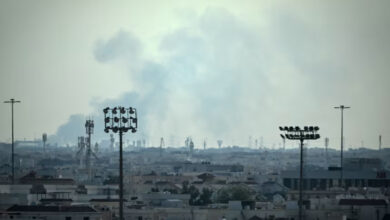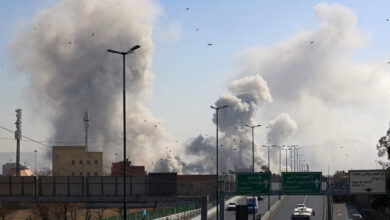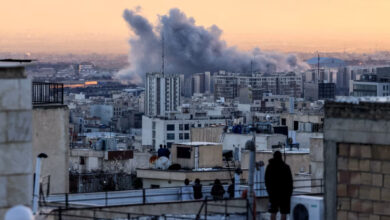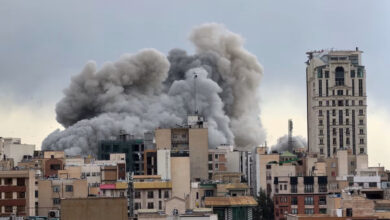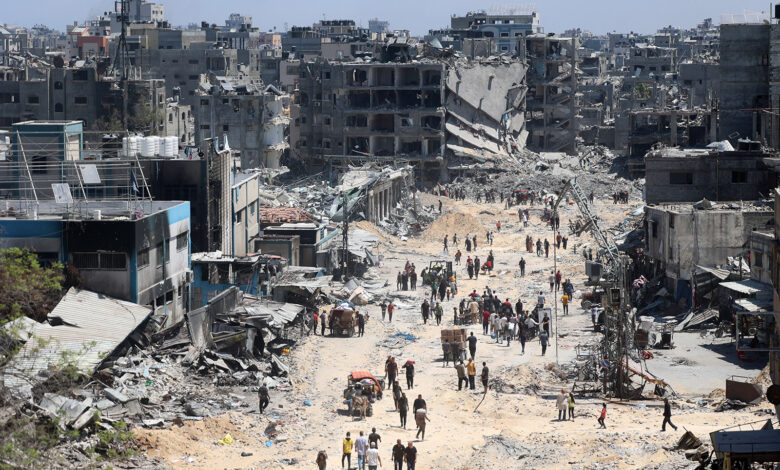
It was a typical London day. Grey sky, clouds, an intermingled dark environment interjected by constant drizzle – it was also cold.
I was being driven north via Regent Street, which was busy with traffic, buses less than a quarter full blocking the road, empty bike lanes, pedestrians hurrying – some with umbrellas – rushing away from the non-stop rain.
I kept warm in a heavy overcoat, scarf and a hat. I glimpsed outside the window, noticing that many shops I had known in the past were no longer there.
I continued reading “How many shocks can the world take?” by Stephen M. Walt, a columnist at Foreign Policy and a Professor of International Relations at Harvard University.
My driver was cautious and I trusted his driving so I concentrated on my reading – except when he suddenly braked as a pedestrian crossed the street rushing, head down, very far from any zebra crossing.
Walt’s essay was concerning but matters had become much worse since he wrote the piece in October 2022: the Hamas terrorist act on October 7, 2023, the Israeli genocide against the Palestinians in Gaza and the West Bank since 8 October, the Sudan conflict, the destabilization in Ecuador, Ethiopia, Haiti and so much more.
This was without mentioning Libya, Ukraine, Russia, France, Iraq, Yemen, South Korea, Myanmar (civil war and the suffering of the Rohingya people), China (the persecution of the Uyghurs), Lebanon, Iran, Syria, Afghanistan and various terrorist groups.
I finished Walt’s essay and started on “The US and China in the Middle East: Three Scenarios for 2030” by Kayaoglu and Kenney. The car trip took two hours and as we were approaching the Global Security Institute campus, I was finishing “What is needed to end the war in Gaza”, issued by the Middle East Institute.
The Global Security Institute, established in 2010 outside London, had a beautiful campus with magnificent headquarters, featuring a very attractive facade with a global motif and geographic design encompassing the world today.
We arrived at the entrance and I was received by a gentleman in a dark suit with the Institute’s famous red tie. He welcomed me and we walked in, heading towards the office of Professor Brian Ashford.
Brian had invited me to attend a gathering he had planned six weeks ago when there was nothing positive occurring regarding the Palestinian-Israeli war.
A lot of talk, a lot of so-called negotiations and pronouncements, but no results.
I had met Brian at a number of special think tank events and I took his invitations seriously. I arrived at his office.
Brian, standing over six feet tall, wore a double-breasted grey suit and a light blue shirt with a matching bowtie. After pleasantries, he offered me coffee which I accepted, and said we had twenty minutes before we entered the auditorium.
We talked about the forthcoming event and Brian explained that there was severe frustration amongst students, fellows, researchers and professors about what was going on around the world, and that we were approaching a major global security breach and that is why we were having this off-the-record event.
Brian explained this was happening in an unorthodox manner, to open up what was on the minds of both the faculty and the students, but that it was also important and timely.
We walked into the auditorium and I was taken aback by the hundreds of participants I could see. There was a platform in the middle with a square table and on all sides, an amalgamation of professors, students, researchers and fellows, in all types of dress from suit and tie to jeans and sneakers.
As we were walking towards the middle stage and Brian was shaking the hands of people he knew, I noticed Ukrainian flags, Palestinian flags and keffiyehs, a very large Israeli flag, a few Russian flags, and another group waving American flags.
There was shouting, clapping, a lot of noise – I felt as if I was at a soccer game in the UK rather than in the audience of a well-established and respected security institute.
The tension, the stress in the air, was strong.
Brian got on stage and demanded quiet. I sat four seats to his left and could see rage in the eyes of some of the audience, many of them students. The first speaker was a British-Israeli Professor who justified all what Israel had done on all fronts, amongst shouts and boos from many in the audience.
“Israel has the right of self-defense!” he shouted again and again and he ended his presentation by saying, “Israel will redesign the Middle East in spite of all of you.”
His five minute intervention was then over – Brian was keeping time as the British-Israeli professor left the auditorium.
The second speaker, a young Palestinian woman who in a calm voice and in sharp bullet points, explained the reasons behind October 7 2023 – although she denounced it – but drew a clear picture of 70+ years of occupation, degrading of a Palestinian population, derailed injustice and the Palestinian prisoners being treated worse by their Israeli prison wardens than what the Americans did to the Iraqis in Abu Ghraib.
At this point, something was thrown at her, and she left the stage, waving her keffiyeh.
For the next two hours, speakers from Ukraine, Iraq, Lebanon, Ethiopia, Myanmar, Russia, Iran and Sudan spoke. I started feeling quite depressed as I saw clearly that there was a lack of real leadership globally, a sad state of wisdom and a serious loss of morality, not to mention the rise in inhumanity.
Brian announced the end of the meeting which miraculously ended peacefully as the crowd exited. As I was walking out, I saw Jeff Mason, a friend from DC.
He took me aside and said to me, “America remains the world’s superpower, even with 128 registered armed militias and 325 Native American reservations plus a huge political divide. All is good,” he reaffirmed, “as you can see, all wake up calls have failed.”
As he walked off, he told me to stay well.
Waving a cab, I wondered what kind of wake up call will shock the world to sanity in 2025 – or will it be more of the same with the chance of a very hard landing?
About the author
M. Shafik Gabr is a renowned leader in international business, innovation, investment and one of the world’s premier collectors of Orientalist art, and an accomplished philanthropist.
During his career, Gabr established over 25 companies plus three investment holding companies including ARTOC Group for Investment and Development which, established in 1971, is a multi-disciplined investment holding company with businesses in infrastructure, automotive, engineering, construction and real estate, over the past three years focusing on investment in technology and artificial intelligence.
Gabr is the Chairman and a founding member of Egypt’s International Economic Forum, a member of the International Business Council of the World Economic Forum, a Board Member of Stanhope Capital, an International Chairman of the Sadat Congressional Gold Medal Committee, and a Member of the Parliamentary Intelligence Security Forum. Gabr is a Member of the Metropolitan Museum’s International Council and serves on the Advisory Board of the Center for Financial Stability, the Advisory Board of The Middle East Institute, and the Global Advisory Council of the Mayo Clinic.
Through the Shafik Gabr Social Development Foundation, Gabr is helping to improve elementary-school education in Egypt, introducing students to arts and culture and promoting sports and physical fitness for youth. The Foundation has its first Medical and Social Development Center in Mokattam, Cairo, offering free medical and health services. In 2012 Gabr established in the US the Shafik Gabr Foundation which supports educational and medical initiatives plus launched in November 2012 the ‘East-West: The Art of Dialogue initiative promoting exchanges between the US and Egypt with the purpose of cultural dialogue and bridge-building.
Gabr holds a BA in Economics and Management from the American University in Cairo and an MA in Economics from the University of London.

